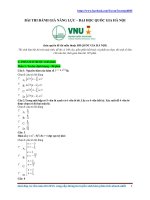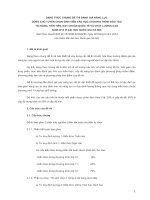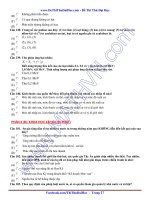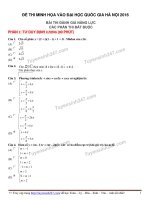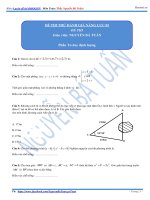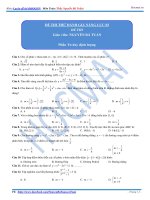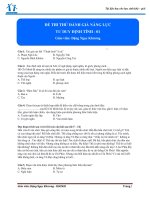- Trang chủ >>
- Đề thi >>
- Đề thi lớp 10
Đề thi đánh giá năng lực anh 10
Bạn đang xem bản rút gọn của tài liệu. Xem và tải ngay bản đầy đủ của tài liệu tại đây (69 KB, 6 trang )
Test 7
Mark the letter A, B, C, or D to indicate the word whose underlined part differs from the other three in
pronunciation in each of the following questions.
Question 1. A. visited
B. played
C. hated
D. needed
Question 2. A. academic
B. grade
C. behave
D. examination
Mark the letter A, B, C, or D to indicate the word that differs from the other three in the position of the
primary stress in each of the following questions.
Question 3. A. cartoon
B. answer
C. reason
D. paper
Question 4. A. survival
B. industry
C. endanger
D. commercial
Mark the letter A, B, C or D to indicate the correct answer to each of the following questions.
Question 5. Neither of the boys came to school yesterday, ________?
A. didn’t they
B. does they
C. did they
D. doesn’t they
Question 6. It is claimed that new nuclear power plants designed to be safer than the current ones______.
A. were built
B. build
C. are soon built
D. built
Question 7. Television can make things memorable for the reason that it presents information ________ an
effective way.
A. over
B. with
C. in
D. on
Question 8. :_______you study for these exams,_______you will do.
A. The harder / the better
B. The more / the much
C. The hardest / the best
D. The more hard / the more good
Question 9. Her husband bought her ______ when he went on holiday in Singapore last week.
A. a beautiful silk yellow scarf
B. a beautiful yellow silk scarf
C. a beautiful yellow silk scarf
D. a beautiful yellow scarf silk
Question 10. When Carol _______ last night, I _______ my favorite show on television.
A. called / was watching
B. had called / watched
C. called / have watched
D. was calling / watched
Question 11. Students can only use technological devices to complete their work _______ investment on
notebooks and books.
A. rather than
B. instead of
C. but for
D. in case
Question 12. By next Saturday, Tom _______ a whole month without smoking a cigarette.
A. will go
B. will have gone
C. has gone
D. has been going
Question 13. ______ in large quantities in the Middle East, oil became known as black gold because of the
large profit it brought.
A. Discovered
B. Discovering
C. Which was discovered
D. That when discovered
Question 14. If you don't have anything ________ to say, it's better to say nothing.
A. construct
B. construction
C. constructive
D. constructor
Question 15. There are other problems of city life which I don't propose to ________at the moment.
A. go into
B. go around
C. go for
D. go up
Question 16. Your store needs a bold sign that will catch the ________ of anyone walking down the street.
That may help to sell more products.
A. eye
B. peek
C. flash
D. glimpse
Question 17. Sometimes in a bad situation, there may still be some good things. Try not to “throw out the
________ with the bathwater”.
A. fish
B. duck
C. baby
D. child
Question 18. The storm did a lot of ________to our village. All the crops were drastically destroyed and
many houses were washed away.
A. injury
B. hardship
C. harm
D. damage
Question 19. He decided to withdraw from the powerboat race as he had a (n) ________ of danger.
A. omen
B. premonition
C. foreboding
D. prediction
Mark the letter A, B, C or D to indicate the word(s) CLOSEST in meaning to the underlined word(s) in
each of the following questions.
Question 20. Emissions from factories and exhaust fumes from vehicles can have detrimental effects on
our health.
A. beneficial
B. neutral
C. needy
D. harmful
Question 21. By being thrifty and shopping wisely, housewives in the city can feed an entire family on as
little as 500.000 VND a week.
A. luxurious
B. economical
C. sensible
D. miserable
Mark the letter A, B, C or D to indicate the word(s) OPPOSITE in meaning to the underlined word(s) in
each of the following questions.
Question 22. His physical condition was not an impediment to his career as a violinist. He has won a lot of
prizes.
A. advantage
B. obstacle
C. barrier
D. disadvantage
Question 23. Tom may get into hot water when driving at full speed after drinking wine.
A. get into trouble
B. stay safe
C. fall into disuse
D. keep calm
Mark the letter A, B, C, or D to indicate the sentence that best completes each of the following exchanges.
Question 24. Nam and Lan are talking about the jobs which only men or women can do.
- Nam: “Do you think that there are any jobs which only men or only women can or should do?"
- Lan: “________”
A. Men are better at certain jobs than women.
B. I agree. This really depends on their physical strengths and preferences.
C. Women and men should cooperate with each other.
D. Men are often favoured in certain jobs.
Question 25. Mary is talking to her professor in his office.
- Mary: “Can you tell me how to find material for my science report, professor?”
- Professor: “________”
A. I like it that you understand.
B. Try your best, Mary.
C. You can borrow books from the library.
D. You mean the podcasts from other students?
Read the following passage and mark the letter A, B, C, or D to indicate the answer to each of the
question.
Vietnam’s population is ageing quickly. In 2017, more than 10 per cent of the population will be 60 and
older, and in 15-20 years the elderly will account for one third of the total population. This raises concerns
about healthcare, welfare and pensions for the elderly at a time when Vietnam is focusing on economic
integration and requires a large labor force. So far two solutions have been proposed: to loosen the two-child
policy and to increase the retirement age to 58 for women and 62 for men. By ending the two-child policy
the government expects to make up for the ageing population within the next 20 years. But its effect could
be creating an uncontrollable boom in the Vietnamese population. When the government loosened the twochild policy in 2015 in a trial period, in the first 6 months of 2016 the third child birth rate increased
remarkably by 7.5 per cent
Raising the retirement age has been proposed by the Ministry of Labor pending parliamentary
evaluation in May 2017. While the policy is beneficial in utilizing the work experience of the elderly while
creating savings in the pension budget, it also means fewer job prospects and promotion opportunities for
younger generations. It is also not in the interest of all the elderly, especially the 70 per cent of Vietnam's
labor force working in manual labor-intensive sectors such as agriculture, manufacturing and construction
where working above the age of 50 can be dangerous and unproductive. Despite these drawbacks, raising the
retirement age is still considered by policymakers as one of the key solutions to the ageing population
problem in Vietnam. However, these are only temporary solutions.
Question 31. The best title for this passage could be ________.
A. Vietnam struggling with ageing population
B. Stopping the two-child policy in Vietnam
C. Raising the retirement age in Vietnam
D. How to solve the aging population in Vietnam
Question 32. Which statement is probably TRUE according to the information in the paragraph 1?
A. In 2017, the elderly take up for one third of the total population, this leads to more concerns about
healthcare, welfare and pensions for the elderly.
B. In 2015, the two-child policy has been officially tightened and succeeded.
C. The government would promote families to have two children to compensate for the ageing population
within the next 20 years.
D. In the next 15-17 years, Vietnam's economy will need a large labor force to integrate with global
economy.
Question 33. The word “its" in paragraph 1 refers to ________?
A. two-Child policy
B. aging population
C. retirement age
D. economic integration
Question 34. In the 2rd paragraph, the writer suggests that ________.
A. The Ministry of Labor has applied raising the retirement age in May 2017.
B. Raising the retirement age can reduce job opportunities for younger generations.
C. The elderly whose age is 50 would be dangerous if they continued to work
D. Raising the retirement age and stopping two-child policy can be considered as long-term and effective
solutions.
Question 35. The word "temporary" in paragraph 2 means ________.
A. constant
B. permanent
C. short-term
D. long-term
Read the following passage and mark the letter A, B, C, or D to indicate the answer to each of the
question.
Coral reefs are some of the most diverse ecosystems in the world, housing tens of thousands of marine
species. With their hardened surfaces, corals are sometimes mistaken as being rocks. And, because they are
attached, “taking root” to the seafloor, they are often mistaken for plants. However, unlike rocks, corals are
alive. And unlike plants, corals do not make their own food. Corals are in fact animals. Appearing as
solitary forms in the fossil record more than 400 million years ago, corals are extremely ancient animals that
evolved into modern reef-building forms over the last 25 million years.
Coral reefs are the largest structures on earth of biological origin. Coral reefs are unique and complex
systems. Rivaling old growth forests in longevity of their ecological communities, well-developed reefs
reflect thousands of years of history.
Corals are ancient animals related to jellyfish and anemones. The branch or mound that we often call “a
coral” is actually made up of thousands of tiny animals called polyps. A coral polyp is an invertebrate that
can be no bigger than a pinhead to up to 30 centimeters (1 foot) in diameter. The polyps extend their
tentacles at night to sting and ingest tiny organisms called plankton and other small creatures. Each polyp
has a saclike body and a mouth that is encircled by stinging tentacles. The polyp uses calcium carbonate
(limestone) from seawater to build a hard, cup-shaped skeleton. This skeleton protects the soft, delicate body
of the polyp.
Reefs only occur in shallow areas that are reachable by sunlight because of the relationship between
coral and algae. Various types of microscopic algae, known as Symbiodinium, live inside of the coral,
providing them with food and helping them to grow faster.
There are over 2,500 kinds (species) of corals. About 1,000 are the hard corals that build coral reefs.
Other corals are soft corals. Soft corals have skeletons that are flexible and can bend with the water. The
three main types of coral reefs are fringing reefs, barrier reefs, and coral atolls. The most common type of
reef is the fringing reef. This type of reef grows seaward directly from the shore. They form borders along
the shoreline and surrounding islands. When a fringing reef continues to grow upward from a volcanic island
that has sunk entirely below sea level, an atoll is formed. Atolls are usually circular or oval in shape, with an
open lagoon in the center. Any reef that is called a barrier reef gets its name because its presence protects the
shallow waters along the shore from the open sea. That protection promotes the survival of many types of
sea plant and animal life.
(Adapted from )
Question 36. Which of the following could best reflect the main purpose of the author in the passage?
A. To prove that coral reefs are animals.
B. To provide the facts about coral reefs.
C. To explain that coral reefs are the most diverse ecosystems in the ocean.
D. To distinguish coral reefs with other animals.
Question 37. The word “solitary” in paragraph 1 could be best replaced by ________.
A. single
B. private
C. general
D. typical
Question 38. The word “Rivaling” in paragraph 2 is closest in meaning to ________.
A. Differing from
B. Comparing with
C. Relating to
D. Changing from
Question 39. According to the passage, the following are true about coral reefs, EXCEPT ________.
A. Coral reefs are mistaken for rocks and plants because of their hardened surface and “roots”.
B. Polyps are the composition of corals.
C. The skeleton of a polyp is created from calcium carbonate in seawater.
D. Corals absorb food in the sunlight using their tentacles.
Question 40. With the help of myriad species of tiny algae, reefs ________.
A. are likely to develop more rapidly.
B. can protect the soft and delicate body of the polyp.
C. are able to find food inside their polyps.
D. find it easier to bend with the water.
Question 41. What does the word “They” in paragraph 5 refer to?
A. coral atolls
B. barrier reefs
C. fringing reefs
D. the shores
Question 42. As mentioned in the last paragraph, why a reef is called a barrier reef?
A. As it keeps developing from a volcanic island that has sunk entirely below sea level.
B. Because its skeleton is flexible enough to defend many marine organisms.
C. Since it saves the low waters along the coastline from the open sea.
D. Because it is one kind of 1,000 hard corals that protect the shoreline.
Mark the letter A, B, C or D to indicate the underlined part that needs correction in each of the following
questions.
Question 43. The composer Verdi has written the opera Aida to celebrate the opening of the Suez Canal,
but the opera was not performed until 1871.
A. has written
B. to celebrate
C. opening of
D. was not performed
Question 44. Those of us who have a family history of heart disease should make yearly appointments with
their doctors.
A. who
B. should make
C. yearly
D. their
Question 45. Modern office buildings have false floors under which computer and phone wires can be lain.
A. office buildings
B. false floors
C. which
D. can be lain
Mark the letter A, B, C, or D to indicate the sentence that is closest in meaning to each of the following
questions.
Question 46. It is over twenty years since I last got in touch with them.
A. I can’t help keeping getting in touch with them for over 20 years.
B. I haven’t gotten in touch with them for over 20 years.
C. I used to get in touch with them for over 20 years.
D. I have been getting in touch with them for over 20 years.
Question 47. She said, "John, I'll show you round my city when you're here."
A. She made a trip round her city with John.
B. She planned to show John round her city.
C. She promised to show John round her city.
D. She organized a trip round her city for John.
Question 48. It’s possible that Joanna didn’t receive my message.
A. Joanna shouldn’t have received my message. B. Joanna needn’t have received my message.
C. Joanna mightn’t have received my message.
D. Joanna can’t have received my message.
Mark the letter A, B, C, or D to indicate the sentence that best combines each pair of sentences in the
following questions.
Question 49. Peter moved abroad for a fresh start. He regrets it now.
A. Peter wishes he hadn’t moved abroad for a fresh start.
B. If Peter moved abroad for a fresh start, he would regret it.
C. Peter regrets not having moved abroad for a fresh start.
D. If only Peter had moved abroad for a fresh start.
Question 50. We came in the room. Our boss was sitting in the front desk.
A. We came in the room, our boss was sitting in the front desk.
B. When we came in the room, our boss had been sitting in the front desk.
C. When we came in the room, in the front desk was sitting our boss.
D. Hardly had we come in the room when our boss sat in the front desk.
THE END
